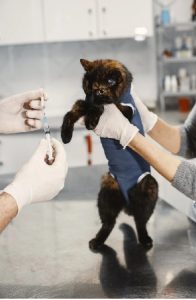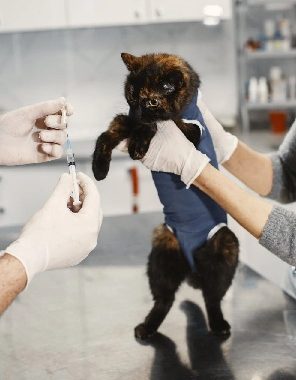
Pet vaccinations are a hotly debated topic among pet owners and veterinarians alike. On one side, there are those who advocate for strict adherence to vaccination schedules, citing the importance of protecting pets from potentially deadly diseases.
On the other side, there are skeptics who question the necessity and safety of vaccines, expressing concerns about adverse reactions and long-term health consequences.
In this comprehensive exploration of the truth about pet vaccines, we’ll delve into the various perspectives, examine the science behind vaccinations, and address common questions and misconceptions.
Understanding Pet Vaccines
Pet vaccinations play a crucial role in safeguarding the health of our beloved furry companions. Vaccines work by stimulating the immune system to produce antibodies against specific pathogens, such as viruses and bacteria.
When a vaccinated pet encounters these pathogens in the future, its immune system is primed to recognize and neutralize them, preventing the development of disease.
For both dogs and cats, there are core vaccines recommended by veterinary professionals. These core vaccines target diseases that pose significant risks to pets and, in some cases, to humans as well.
For dogs, core vaccines typically include those for distemper, parvovirus, adenovirus, and rabies. For cats, core vaccines commonly protect against feline viral rhinotracheitis, calicivirus, panleukopenia, and rabies.
Benefits of Pet Vaccinations
The benefits of pet vaccinations cannot be overstated. Vaccines have played a pivotal role in reducing the prevalence of deadly diseases among pets, leading to longer and healthier lives.
By vaccinating pets, we not only protect individual animals but also contribute to the overall public health by preventing the spread of contagious diseases.
One of the most significant achievements of pet vaccination programs is the near-eradication of rabies in many parts of the world. Rabies is a fatal viral disease that can be transmitted to humans through the bite of an infected animal.
Vaccinating pets against rabies not only protects them from this deadly disease but also helps create a barrier of immunity within the community, reducing the risk of human exposure.
Puppy composition notebooks: vaccinate and protect your dog after purchase
Addressing Concerns and Misconceptions
Despite the overwhelming evidence supporting the safety and efficacy of pet vaccines, concerns and misconceptions persist. One common misconception is the belief that vaccines are unnecessary for pets that live indoors or have limited exposure to other animals.
While indoor-only pets may have a lower risk of exposure to certain diseases, they are still susceptible to others, such as rabies, which can be transmitted through wildlife or even bats that enter the home.
Another concern raised by some pet owners is the potential for adverse reactions to vaccines. While it’s true that vaccines, like any medical intervention, can have side effects, severe reactions are rare.
Most pets experience mild, temporary symptoms such as lethargy or soreness at the injection site, which typically resolve on their own within a day or two. Serious adverse reactions, such as allergic reactions, are exceedingly rare and are usually outweighed by the benefits of vaccination.
Pet Passport notebook: Vaccination records | neutering records | veterinary appointment records
�
Vets Against Vaccines: Examining the Controversy
In recent years, there has been a growing movement of veterinarians and pet owners who are skeptical of the conventional approach to pet vaccinations. Some veterinarians argue that the current vaccine protocols may be overly aggressive, leading to unnecessary risks and potential harm to pets.
They advocate for a more individualized approach to vaccination, taking into account factors such as the pet’s age, lifestyle, and risk of exposure to certain diseases.
One of the concerns raised by vets against vaccines is the potential for over-vaccination, particularly in older pets or those with underlying health conditions.
Over-vaccination refers to the administration of vaccines that provide immunity beyond what is necessary to protect against disease. This practice can increase the risk of adverse reactions and may not confer any additional benefit to the pet.
Vaccination: What You Must Know Before You Vaccinate Your Dog
Is It Illegal to Not Vaccinate Your Dog?
The legality of not vaccinating your dog varies depending on location. In many jurisdictions, rabies vaccination is mandatory for dogs due to public health concerns. Failure to vaccinate against rabies can result in legal consequences, including fines or quarantine for the pet.
Additionally, some boarding facilities, groomers, and dog parks may require proof of vaccination before allowing pets on the premises.
However, when it comes to other vaccines, such as those for distemper or parvovirus, the laws and regulations regarding vaccination are less stringent.
While veterinarians strongly recommend these vaccines for the health and well-being of pets, there may not be legal repercussions for pet owners who choose not to vaccinate against these diseases.
What Happens If Your Dog Is Not Vaccinated?
The decision not to vaccinate a dog carries inherent risks. Without the protection afforded by vaccines, dogs are susceptible to a host of infectious diseases that can cause serious illness or even death.
Diseases such as distemper and parvovirus are highly contagious and can spread rapidly among unvaccinated dogs, particularly in environments where animals congregate, such as dog parks or kennels.
In addition to the health risks posed to the individual dog, unvaccinated pets can serve as reservoirs for infectious diseases, potentially putting other animals and even humans at risk.
This is especially concerning in the case of zoonotic diseases, which are those that can be transmitted between animals and humans. By vaccinating pets, we not only protect their health but also contribute to the overall health and safety of our communities.
Pet Medical Record Sheets for Vets
Why You Shouldn’t Vaccinate Your Dog: Debunking Common Myths
Despite the overwhelming evidence supporting the benefits of pet vaccination, there are some who advocate against vaccinating dogs altogether.
These individuals often cite a range of concerns, from perceived risks of vaccine-related adverse reactions to broader philosophical objections to medical intervention.
However, many of these arguments are based on misinformation or misunderstandings of the science behind vaccines.
One common myth is the belief that vaccines are more harmful than the diseases they prevent. While it’s true that vaccines, like any medical intervention, carry a small risk of adverse reactions, the benefits far outweigh the risks for the vast majority of pets.
The diseases prevented by vaccines, such as distemper and parvovirus, can cause severe illness, lifelong complications, and even death in untreated animals.
Another misconception is the notion that natural immunity acquired through exposure to a disease is superior to vaccine-induced immunity. While it’s true that natural infection can confer immunity, it often comes at a significant cost in terms of the animal’s health and well-being.
Vaccines provide a safe and effective means of achieving immunity without subjecting pets to the risks associated with disease exposure.
Conclusion: Partnering with Veterinarians for Pet Well-being
Dispelling these common myths emphasizes the importance of vaccination in ensuring a pet’s health and preventing the spread of infectious diseases. Pet owners are encouraged to collaborate with their veterinarians, discussing individualized vaccine plans and addressing any concerns.
Ultimately, debunking these myths empowers pet owners to make informed decisions, promoting the well-being and longevity of their beloved companions.
Further Reading:
Nearly Half of Dog Owners Are Hesitant to Vaccinate Their Pets
The Truth About Dog Vaccinations
4 Reasons You Shouldn’t Vaccinate Your Dog or Cat Yourself
FAQs:
Do dogs really need vaccines?
Yes, dogs really need vaccines. Vaccines are crucial for protecting dogs from potentially deadly diseases like distemper, parvovirus, and rabies.
Vaccination not only safeguards the health of individual dogs but also contributes to public health by preventing the spread of contagious diseases.
Consulting with a veterinarian can help determine the appropriate vaccination schedule based on the dog’s age, lifestyle, and risk factors.
�
Is fully vaccinated dog safe?
Yes, a fully vaccinated dog is generally safe from many contagious and potentially deadly diseases. Vaccines help stimulate the dog’s immune system to recognize and fight off specific pathogens, reducing the risk of illness or severe consequences.
However, no vaccine is 100% effective, and there is always a small chance of breakthrough infections. Regular booster vaccinations and preventive measures can further enhance a dog’s protection against infectious diseases.
�
Should I vaccinate my cat?
Yes, you should vaccinate your cat. Vaccinations are crucial for protecting your cat from serious and potentially life-threatening diseases such as feline viral rhinotracheitis, calicivirus, panleukopenia, and rabies.
Vaccinating your cat not only safeguards their health but also helps prevent the spread of contagious diseases within the feline population and protects public health.
Consult with your veterinarian to determine the appropriate vaccination schedule for your cat based on their age, lifestyle, and risk factors.
�
Are dog vaccinations really necessary?
Yes, dog vaccinations are essential for protecting your pet from potentially deadly diseases like distemper, parvovirus, and rabies. Vaccinations stimulate the immune system to fight off specific pathogens, preventing illness and promoting public health by reducing the spread of contagious diseases.
While some may question their necessity, the overwhelming consensus among veterinary professionals is that vaccinations are crucial for ensuring the health and well-being of dogs and the communities they inhabit.
�
What is the truth about cat vaccines?
The truth about cat vaccines is that they are crucial for protecting feline health. Core vaccines, targeting diseases like rhinotracheitis, calicivirus, and panleukopenia, are highly effective and recommended by veterinarians.
While adverse reactions are possible, severe ones are rare compared to the risks of disease. Vaccinating indoor cats is still important for preventing potential exposure to rabies and other contagious diseases.
�
Are dog vaccines 100% effective?
Dog vaccines are not 100% effective. While they significantly reduce the risk of disease, there’s always a possibility of breakthrough infections. Factors like the pet’s health status, vaccine quality, and environmental exposure influence effectiveness.
However, vaccines remain the best defense against preventable diseases, providing crucial protection for dogs and contributing to public health efforts.
Regular booster shots may enhance and prolong immunity, reducing the likelihood of infection.
�
What happens if you don’t vaccinate your cat?
If you don’t vaccinate your cat, it’s at risk of contracting serious and potentially fatal diseases like feline viral rhinotracheitis, calicivirus, and panleukopenia. Without vaccination, your cat lacks the necessary immunity to fight off these diseases, leaving it vulnerable to illness and suffering.
Additionally, an unvaccinated cat can serve as a reservoir for infectious diseases, posing a risk to other pets and even humans. Vaccination is crucial for ensuring your cat’s health and preventing the spread of contagious diseases.
